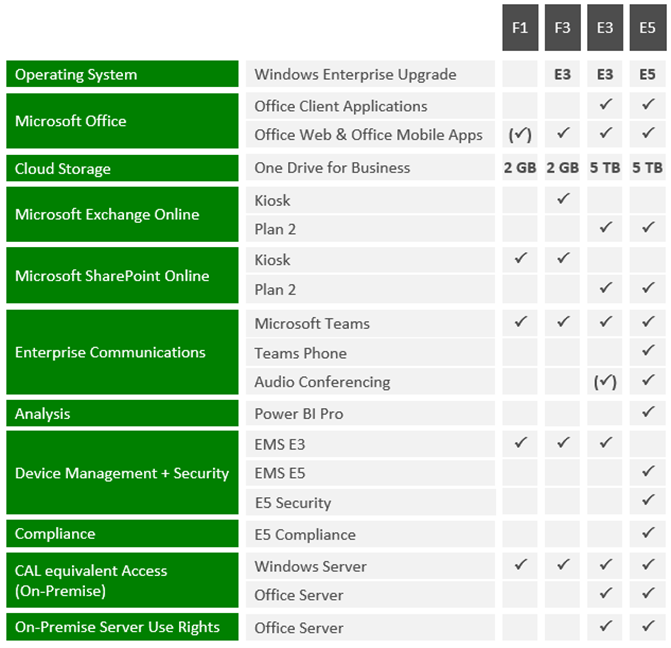
Is Microsoft 365 E7 coming soon?
The use of Microsoft 365 product suites is now widespread. Since the beginning of the year, Microsoft has been offering new online services on an almost monthly basis, for which additional licenses can be purchased in addition to the M365 plans - even to M365 E5. The question quickly arises whether Microsoft might not bundle these services into an M365 E7 in the future. This article summarizes recent developments and looks ahead to a possible E7 license.
Microsoft 365
Microsoft 365 originally emerged from Office 365 in July 2017 and is a commercial product suite consisting of Windows Enterprise Upgrade, Office 365 and Enterprise & Mobility Suite. Since then, the offering has been continuously developed and, in addition to Microsoft 365 E3 and E5, has also been supplemented with functionally slimmed-down plans for employees in the direct production areas (frontline workers). Most of the plans that are part of the suite can also be purchased individually or combined with the suites. In addition, the suites include extended usage rights (e.g. for Office On-Premise Server and local installations of Office Professional Plus with so-called "From-SA" usage rights).
The following overview shows the composition of the product suites (F1, F3, E3 and E5)

Add-on plans
Since the beginning of the year, Microsoft has been offering new online services almost monthly that can be purchased in addition to the Microsoft 365 suites. These are so-called add-on plans that require an M365 license as a prerequisite, for example. Among others, Teams Premium, Intune and M365 Copilot are worth mentioning here.
Teams Premium is an extension to the standard Teams functionality included in all M365 and O365 plans. This includes, for example, the personalization of meetings and online events, but also security-related functions such as end-to-end encryption. Features such as live translations were initially made available in the Teams standard functionalities for test purposes, only to be marketed as a separate license for a fee, to the annoyance of many customers.
In the Intune portfolio, advanced endpoint management and security features are marketed as add-on plans. To this end, Microsoft offers add-ons for individual functions such as Remote Help, bundled functions (MS Tunnel for Mobile Application Management and Intune Management of Specialty Devices) in Intune Plan 2 and all functions with the Intune Suite.

In March 2023, Microsoft announced the new online service M365 Copilot. This is to provide support via artificial intelligence in Office applications (such as Word, Excel, PowerPoint, Outlook, Teams) and interact with the user via a/via business chat to complete tasks for them. Details on the licensing and pricing model are not yet available at the time of writing. However, due to the announced productivity increases, a paid add-on license to the existing M365 suites is again to be expected.
Microsoft 365 E7: Why it could happen
So what's in favor of a new M365 E7 Suite? First of all, all add-on products have the same license metric, namely per user. This means they could easily be combined with the existing E5 license in a new product. Since all services are to be licensed in addition to M365 E5, combining them into one E7 license would be a plausible step once sufficient additional plans are available. Comparing M365 E3 to E5, the difference is mainly E5 Compliance, E5 Security and the Office 365 E5 functionalities like PowerBI Pro and Teams Phone.
If all add-on plans are purchased, customers will also expect better pricing. Instead of discounting the individual products, a suite discount would be an effective pricing instrument. Furthermore, this would again provide a corresponding upsell potential for customers who have already licensed M365 E5, and product penetration could be increased.
Microsoft 365 E7: Why it won't happen
Suites always bring with them the problem that they may also contain services that the customer does not need, but buys because of the lower price. For the manufacturer, this poses the challenge of having to build up or maintain capacity for the online services included. In the case of contractual adjustments with a reduction in the scope of functions, this results in empty capacities. This problem would be avoided with demand-based licensing.
In the end, the decision about M365 E7 will probably be made in marketing and product management in Redmond. If Microsoft follows the strategy of M365 E7, it will probably not take longer than 12 months until such an offer is available. So it remains exciting.
Interested in more vendor and license information?
If you want to stay up to date on changes in contract and license terms and developments at the major cloud and software vendors, try the Vendor Observer Competence Center (VOCC) from VOICE Bundesverband der IT-Anwender e.V. supported by Complion. You can find more information about the VOCC on the VOICE website and in this blog post.
Author: Felix Baran